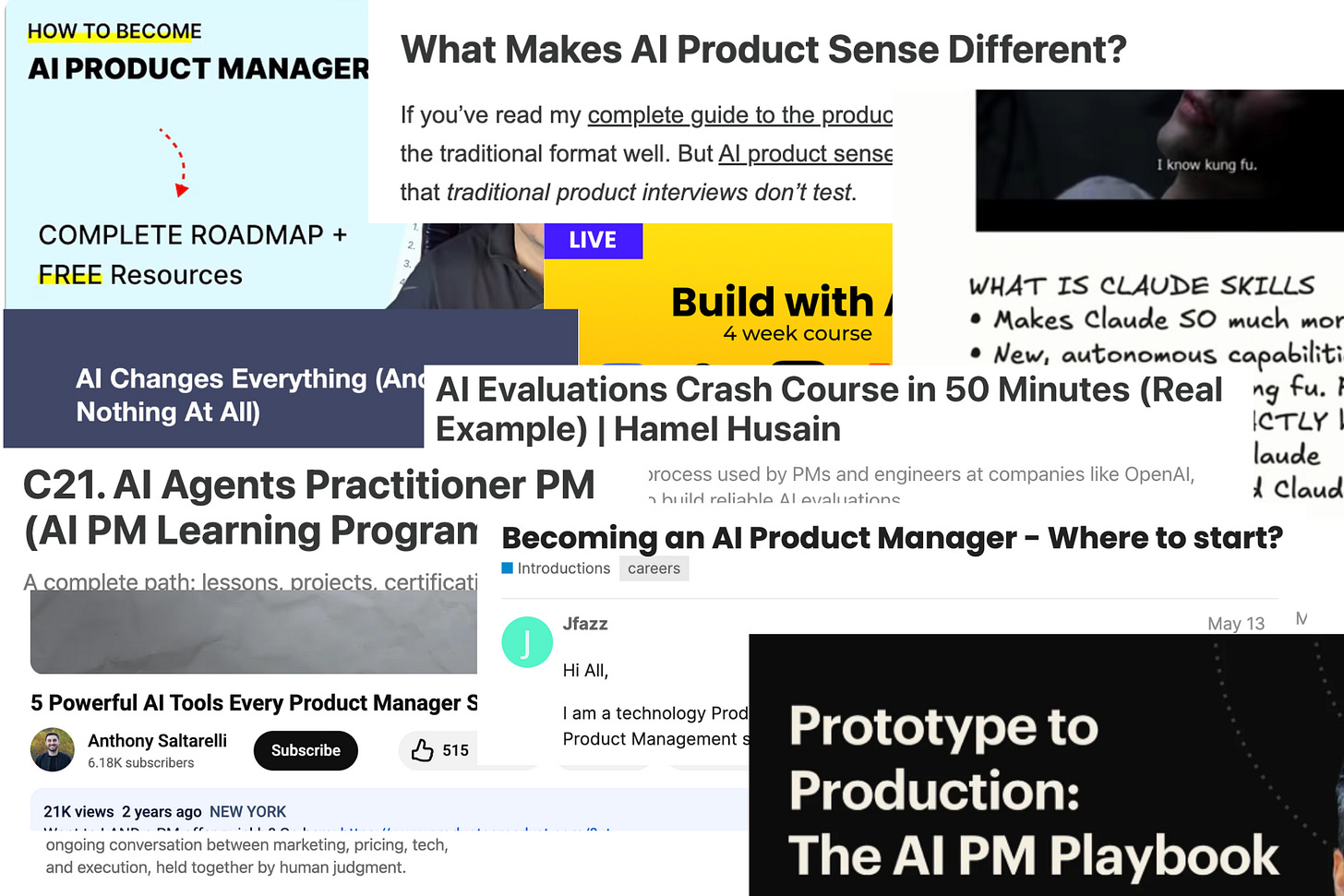Don't let AI get in the way of being good at your job.
We all need to hone our AI skills. But keep it focused. Use it to become a better product person. And avoid falling down the AI rabbit hole.

Have you been Vibe Coding? Are you up to speed on Evals? Have you harnessed the power of Claude Skills to revolutionise your workflows? Or perhaps signed up for a course on how to be an AI PM in pursuit of a hot new job?
No matter where you are in your career, you need to be doing some or all of the above. Part out of curiousity, but equally as a means of future-proofing your career.
But here’s the kicker: none of this will, on its own, actually make you any better at your job. And in the long term - that’s what matters.
Don’t get me wrong, if you’re job hunting. sprinkling a bit of ‘AI’ on your CV might make you more tempting to a hiring manager. But fundamentally better at product work? Not so much.
Yes AI is transforming how we work and what we work on, but the stuff that really matters, the fundamental capabilities that make someone good at product work haven’t changed.
As always, start with Achievements
In my Vital 9 framework, I’ve talked about the importance of Achievements as the engine room of your career. Specifically: Skills Growth, Meaningful Impact and Domain Expertise. As your Achievements grow, so does your Market Value.
None of this has changed. Nor is it going to change. What has changed is AI’s ability to help you accelerate your development, your capacity to achieve...and with it, your earning potential.
At the same time, if you are by nature curious (and you should be), AI also has the ability to be a massive time sink. The shiniest of shiny new things to distract you - and without focus it can actually get in the way of you getting better at your job rather than help you with it.
So how you adopt AI needs to focussed and rooted in your plans to develop your career: particularly in Skills Growth and Meaningful Impact.
Let’s take these one at a time.
Skills Growth
Remember Product Skills Frameworks? (I did a review of some of them here). Before AI came to town, as our profession was becoming more, err, professional, these were all the rage.
They’re all still incredibly valid. All still based on good evidence about what you actually need to be able to do to be successful in your role.
While individual frameworks might vary—and individual coaches/thought leaders/gurus might badge theirs differently (with varying levels of effectiveness)—they all tend to hit the same notes:
Good strategic sense
Strong Discovery Skills - being able to take customer and business needs and turn them into deliverables
Good communication and influencing skills
Product and technical understanding
Business/customer understanding
Strong delivery/execution skills
Team leadership and/or mentoring/coaching skills
And in each of these areas AI has the potential to make you more effective. So, you need to know where your strengths and weaknesses are in this list, and you need to be asking yourself:
Which of my strengths can I supercharge with AI?
Which of my weaknesses/growth areas can I work on with AI?
You don’t, for example, Vibe Code just for the sake of it (as much fun as that is). You do it to sharpen your Discovery process by developing rapid prototypes, or to improve how you work with engineers and designers in order to deliver better work more efficiently.
Meaningful Impact
The same is true when thinking about impact.
The things you’re chasing haven’t changed: more revenue, increased retention, reduced costs.
AI is just a more powerful way to get there. Use it to test more hypotheses, analyse more data, spot patterns you’d have missed, or prototype solutions you couldn’t have built before.
So the question you need to ask is: how can you use AI, either in your personal ways of working or in the software you deploy, to be more impactful?
What to do right now..
So here’s my guidance for the next six months:
If you’re an IC: Pick one core product skill you want to develop (strategy, discovery, stakeholder management—whatever your weak spot is). Then deliberately use AI to help you get better at it faster. Document the outcomes, not just the tools.
If, on the other hand, you find yourself falling down an AI rabbit hole…endless learning new stuff, but not actually using it. Stop. Get back to basics and ask yourself what are you actually trying to achieve.
If you’re a leader: Make sure your team’s development plans focus on capabilities, not technologies. Yes, create space for AI experimentation. But judge success on whether people are becoming better product thinkers, not just better prompt writers.
And for everyone: stay curious, stay practical, and remember that product work is fundamentally about understanding problems and shipping solutions that create value. AI is a powerful accelerant for that work. It’s not a substitute for it.

